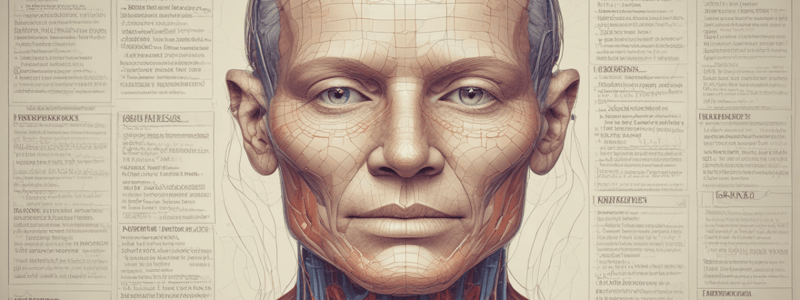Podcast
Questions and Answers
What is medical terminology, and why is it important in healthcare professions?
What is medical terminology, and why is it important in healthcare professions?
Medical terminology is a special vocabulary of scientific and technical terms used in healthcare professions to speak and write effectively and precisely. It is important for healthcare workers to communicate effectively and quickly.
What are the three basic word elements that medical terms are based on?
What are the three basic word elements that medical terms are based on?
Word roots, prefixes, and suffixes.
What is the purpose of using medical abbreviations in healthcare?
What is the purpose of using medical abbreviations in healthcare?
To communicate quickly and concisely with other healthcare workers.
What is a word root in medical terminology?
What is a word root in medical terminology?
What is the function of a prefix in medical terminology?
What is the function of a prefix in medical terminology?
What is a suffix in medical terminology?
What is a suffix in medical terminology?
What is an example of a word root, and what does it mean?
What is an example of a word root, and what does it mean?
Why is it important to use standard medical symbols and abbreviations in healthcare?
Why is it important to use standard medical symbols and abbreviations in healthcare?
What is the primary step in determining the meaning of a medical term?
What is the primary step in determining the meaning of a medical term?
What does the prefix 'AD-' describe in medical terminology?
What does the prefix 'AD-' describe in medical terminology?
What is the root word 'ONCO-' related to?
What is the root word 'ONCO-' related to?
What does the suffix '-OMA' describe in medical terminology?
What does the suffix '-OMA' describe in medical terminology?
What is the root word 'CARDIO-' related to?
What is the root word 'CARDIO-' related to?
What does the prefix 'HYPER-' describe in medical terminology?
What does the prefix 'HYPER-' describe in medical terminology?
What is the root word 'NEURO-' related to?
What is the root word 'NEURO-' related to?
What does the suffix '-ITIS' describe in medical terminology?
What does the suffix '-ITIS' describe in medical terminology?
What is a nonconstructed medical term?
What is a nonconstructed medical term?
What is the purpose of breaking down a medical term into its word parts?
What is the purpose of breaking down a medical term into its word parts?
Flashcards are hidden until you start studying
Study Notes
Medical Terminology Overview
- Medical terminology is a special vocabulary used in healthcare to communicate effectively and precisely.
- It is based on an understanding of three basic word elements: word roots, prefixes, and suffixes, often derived from Greek and Latin words.
Importance of Medical Terminology
- Healthcare workers use medical terminology and abbreviations daily to communicate quickly and efficiently.
- Medical abbreviations are shortened forms of words used to communicate concisely.
- Standard abbreviations should always be used, and unfamiliar abbreviations should be avoided.
Medical Symbols
- Examples of medical symbols include: ′ (foot), ″ (inch), ° (degree), ♀ (female), ♂ (male), and # (pound or number).
Root Words
- A word root is the subject of a medical term and the foundation upon which the term is built.
- Word roots typically indicate a tissue, organ, body system, color, condition, substance, or structure.
- Examples of root words include: phleb (vein), onc (tumor), and cardi (heart).
Prefixes
- A prefix is a word element that comes before a word root, modifying its meaning by adding information such as presence, absence, location, number, or size.
- Examples of prefixes include: an- (without), ab- (away from), ad- (near), bi- (two), and dys- (difficult or painful).
- Prefixes can describe location, direction, amount, size, and more.
Suffixes
- A suffix is a word ending that follows a word root and either changes or adds to the meaning of the word root.
- Examples of suffixes include: -aemia (condition of blood), -ectomy (excision or removal), -itis (inflammation), and -ology (study or science of).
- Suffixes can describe conditions, diseases, procedures, and more.
Word Breakdown
- Prefixes help describe the location, direction, amount, and size of a medical term.
- Roots help determine which part of the body a medical term relates to.
- Suffixes help describe what the word or problem relates to.
Frequent Root Words
- Examples of frequent root words include: oste (bone), myo (muscle), neuro (nerves), derm (skin), and cardio (heart).
- Other frequent root words include: angi (blood vessels), ven (veins), neph (kidney), rhino (nose), and more.
Other Common Roots and Suffixes
- Examples of other common roots and suffixes include: echo- (using ultrasonic waves), electro- (using electricity), -ectomy (removal of), and -gram (picture).
- Other common roots and suffixes include: -graph(y) (process of making an image), -otomy (making a cut in), -scopy (using an instrument for viewing), and -stomy (create an opening).
Nonconstructed Medical Terms
- Nonconstructed medical terms are not constructed from a combination of word parts.
- Such terms are exceptions to the rule of constructing medical terms using word roots, prefixes, and suffixes.
Studying That Suits You
Use AI to generate personalized quizzes and flashcards to suit your learning preferences.



